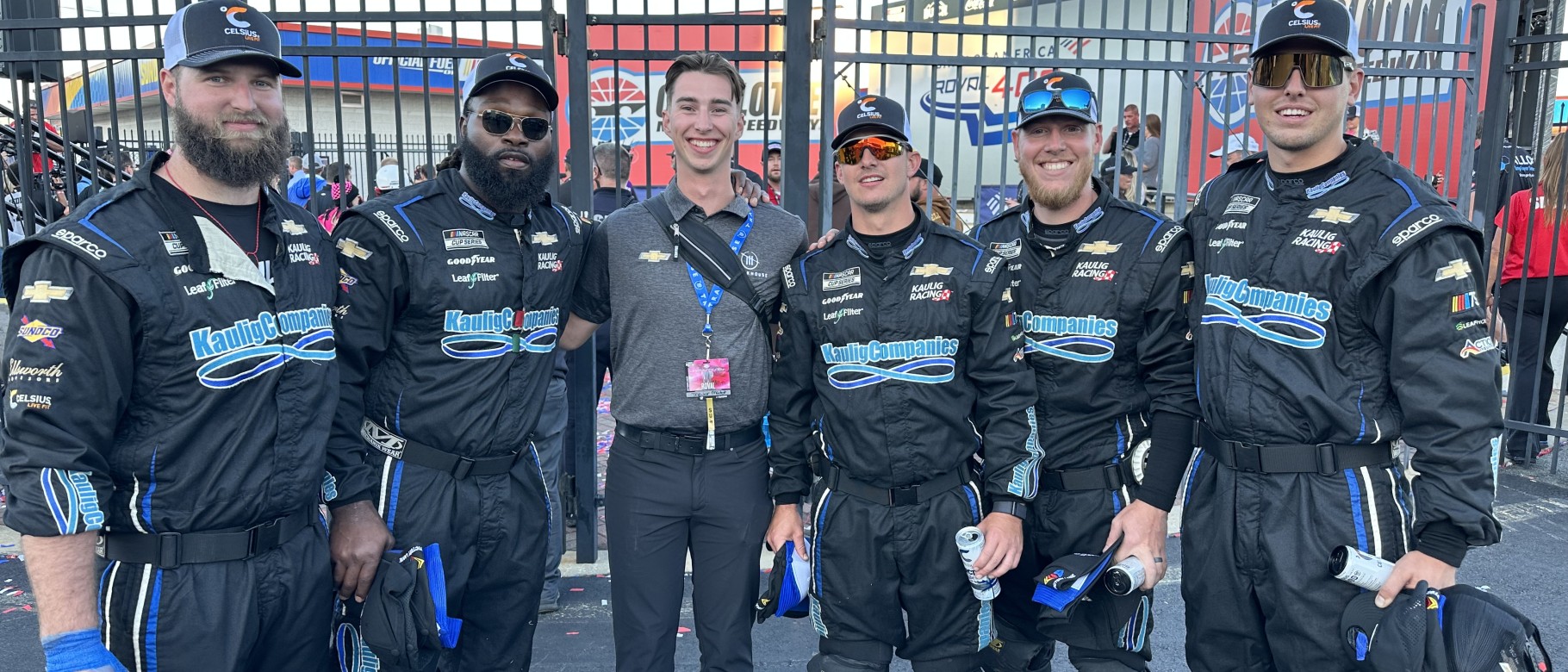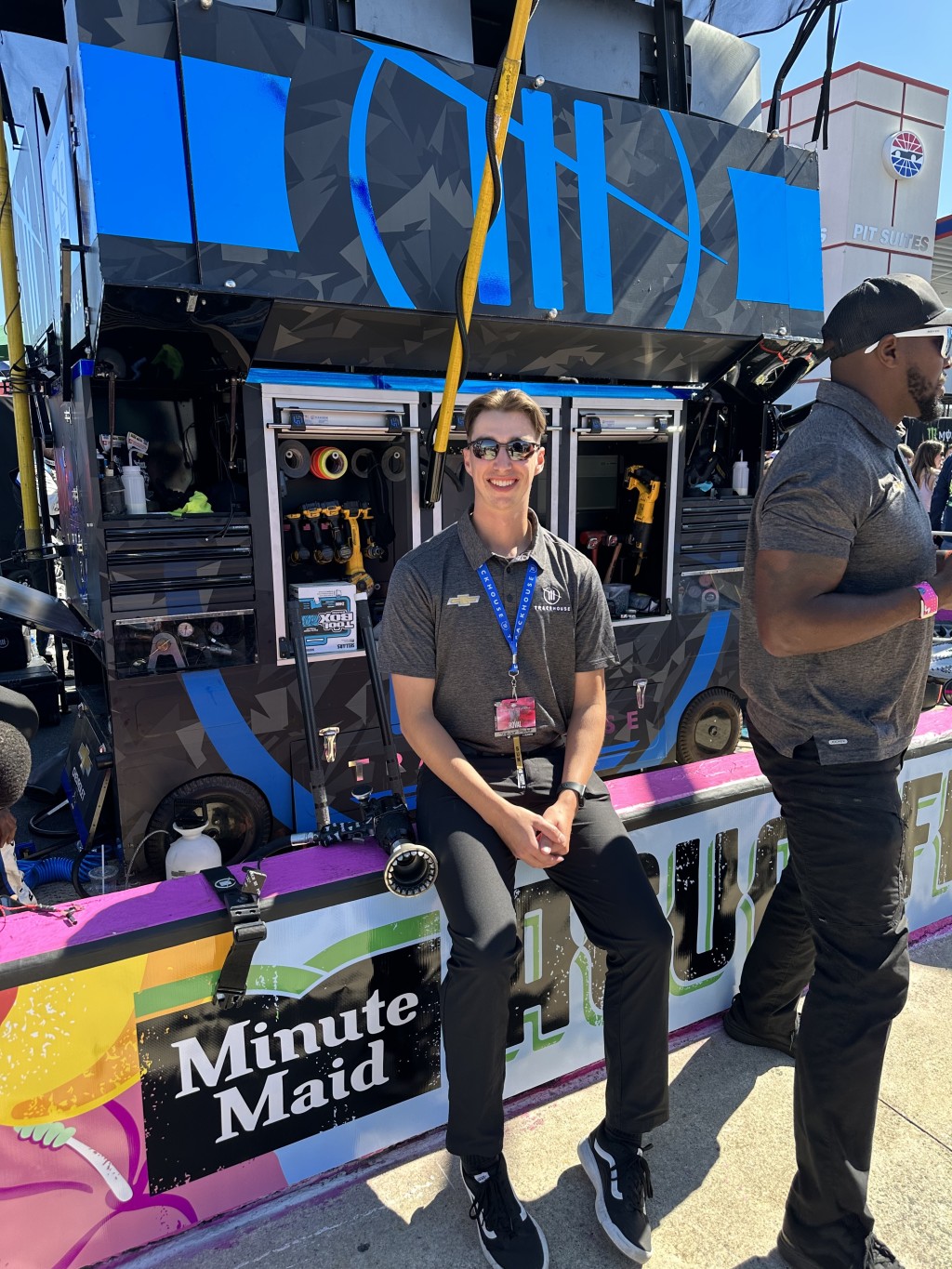Athletic Training student takes clinical education for a spin with NASCAR immersion
An unconventional clinical immersion takes a student from the backroads of Vermont to the NASCAR track

Most athletic training students complete their clinical coursework on the sidelines of stadiums or at the foot of AstroTurf fields. But UNE Class of ’24 student Trevor Matot took a different track this past fall by fulfilling his clinical requirements with a NASCAR-affiliated racing crew.
Matot spent nearly four months in Concord, North Carolina, enduring scorching temperatures to complete a clinical immersion with Trackhouse Racing, a motorsports group that competes in the NASCAR Cup Series. There, he focused on training and rehabilitating the pit crew — the unsung heroes of the motorsports world, whose heavy lifting ensures safe and efficient race operations.
Matot is in his final year of UNE’s Athletic Training 3+2 degree program track, which allows students to earn a B.S. in Health Sciences and an M.S. in Athletic Training in just five years. He said working with the pit crew gave him insight into how to best treat sport-related injuries that don’t occur on a court or a field.
“It was really interesting to watch the pit crew as an athletic trainer because you’re used to seeing a traditional sport like lacrosse, for instance, with someone throwing and catching a ball,” he remarked. “When you’re watching the pit crew, you’re watching all these guys complete a set of small, precise movements in just about eight seconds. It was all new movements that I had to learn, which was really cool.”
With cars soaring past him, the immersion provided Matot with real-world experience, allowing him to apply his academic knowledge to a fast-paced environment. As a racing fan, the immersion was a full-circle moment. He grew up watching NASCAR with his dad in his hometown of Colchester, Vermont, and later began working on racecars for a local track there.
But Matot said he never considered the possibility of combining his passion for racing with a career in athletic training.
“Never once did I think that I would go to a NASCAR team and work doing athletic training with them,” he said. “It was a really eye-opening experience.”
Graduates from UNE’s Master of Science in Athletic Training program have gone on to work in a variety of diverse settings, including strength and conditioning, occupational health, sports medicine, and public safety, among others. Many have gone on to work in major league franchises including Major League Baseball and the National Basketball Association, while faculty have been tapped to treat athletes at the Olympic Games, most recently in Beijing in 2022.
Christopher Rizzo, D.A.T., clinical professor and coordinator of clinical education for the Athletic Training program, said Matot’s experience represents one of several emerging settings where athletic trainers are establishing their value as health care providers.
Such settings include the military, municipalities, industry, and — as Matot had the opportunity to experience — American motorsports, Rizzo said.
“The full-year immersive experience that we have built into the M.S.A.T. program provides students such as Trevor with the opportunity to travel to areas of the country where they can pursue their passion and the athletic training setting that interests them,” Rizzo remarked.
As Matot prepares to graduate with his master’s in athletic training this May, he is keeping his options open for job possibilities. He said his experience in North Carolina has left a lasting impression that will shape the way he approaches patient care in his career.
“I really picked up on the working relationships everyone had with each other and could see how everyone cared about one another,” he said. “The experience helped me become better at what I do. It’s been really rewarding.”
